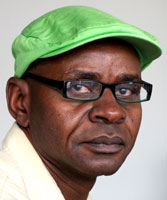Indaba 2011: Angola recovers from war, longs for tourism growth

That is why tourists are requested to support that cause!
Tourism in Angola has been growing at an annual rate of 7%, surpassing the agricultural (2.3%) and industrial (3%) sectors, the government said.
A mere 121 426 foreign tourists visited Angola in 2006, 194 730 in 2007, 294 258 in 2008, 365 784 in 2009 and 424 919 in 2010, bringing the total of foreign arrivals to more than 1.4 million, according to statistics compiled by the immigration and foreigners service.
Tourism sector at all time high
Europeans lead the way in terms of visiting Angola, distantly followed by Americans, Asians and Africans. In the SADC region, South African tourists emerged top in visiting Angola (93 472 in the past five years), followed by Mozambicans (13 096) and Namibians (7492). These figures demonstrate that the country's tourism sector is at an all time high thanks to 'solid' mechanisms and strategies put in place by the MPLA-led government.
The country's tourism attractions include the sighting of alligators in the Catumbela River (south), lying down in the southern beaches' paradise (Lobito and Benguela), mini-safari through the Benguela savanna to watch the African gazelle, hiking, leisure fishing, and visiting the Kissama National Park (just outside Luanda), among others.
Fernando Ludgero da Silva Diogo, spokesperson for Infotur, a ministry of hospitality and tourism body, told Bizcommunity.com: "Hosting the African Cup of Nations in 2010 boosted our tourism in one way or another. And despite that Togo incident which we have since recovered from, we have made significant gains in tourism and we are forging ahead, very optimistic about the future and hoping to take this sector to an even higher level.
"But we need foreign tourists to come to Angola to support our efforts."
Da Silva Diogo also said his government is investing a lot in rebuilding infrastructure, including roads, bridges and luxury hotels, to make it accessible for tourists to move around.
Enriching the MPLA elite
Angola tourism authorities have been bragging that their country's tourism boom has created many jobs and improved the lives of many communities, pointing out that the sector has added 43.8% of jobs in the nation's list of scarce employment.
But critics refute these suggestions, stating that Angola's economic boom, including tourism, have mostly enriched the MPLA elite and their families and well-connected friends, and rarely trickled down to ordinary citizens, who are still suffering from the brunt of the ruling party's 36 years of massive corruption, nepotism and repression.
Angola's unemployment rate stands between 40 and 45%, and the poverty rate is currently at 70%. Well-travelled Angolans, mostly coming from MPLA families and allied business people, are said to be spending a fortune (sleeping in five-star hotels and engaging in aggressive shopping sprees) every time they visit South Africa and Europe.
The Angolan government, described by critics as 'extremely corrupt' and 'oppressive', has been cracking down on anyone, including media, artists and independent analysts, who criticise the head of state and government officials. 'Guilty' parties are either tortured, executed, or sentenced to lengthy jail terms.








